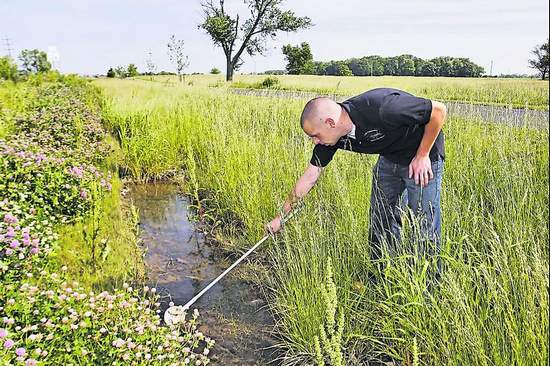Jacob Rowland (BS '08) Reports West Nile Not Yet Here, But Threat Remains
Journal and Courier
by Lakin Brown
June 9, 2008
 |
Jacob Rowland with the Tippecanoe County Health Department looks for mosquito larvae Friday in the McCormick Ditch in West Lafayette. Standing water is a haven for mosquitos that could possibly carry the West Nile virus. (photo By Michael Heinz/Journal & Courier) |
Two mosquito groups have tested positive for the West Nile virus in Marion County.
It's that time again in Indiana.
Local resident Jackie Wilson said she's aware of the threat.
"I'm concerned enough to take preventive measures at home," Wilson said.
"We used to keep water out for the dogs, and now we try to keep open containers of water to a minimum, as well as keeping the grass mowed."
Nationally, there have been eight reported cases of West Nile in humans so far this year, with victims as far north as Tennessee.
According to the Indiana State Department of Health, there were 24 cases of West Nile virus in humans statewide last year.
Although none of those cases was in Tippecanoe County, the virus is still present, health department director Ron Cripe said.
"We're basically in a situation now where we know it's here, and it's just a matter of locating it and managing it," he said.
Jacob Rowland, an environmentalist with the county's health department, is in charge of monitoring and containing mosquito populations.
He said the primary method involves going to known breeding sites and picking up larvae for testing.
Once a population of West Nile-carrying mosquitoes is found, Rowland sprays the area to kill the mosquitoes.
"The spray is made up of corn granules laced with larvacide," Rowland said. "It specifically targets the mosquito larvae."
In addition to the department's monitoring and containment work, Rowland said it is important for people to recognize potential breeding grounds on their property.
Even things that seem insignificant can prove to be otherwise.
"We found just a small, plastic yogurt cup that had collected water and was full of mosquito larvae," said Rowland.
Recent rain has led to additional concern for some local residents, such as Brenda Hofmann of Lafayette.
"It's been a little more rain than usual," Hofmann said. "That gives mosquitoes more breeding grounds."
Cripe said that even with the recent rain, it was extremely difficult to predict the severity of the West Nile season.
That is the case in part because the Culex mosquito, the type of mosquito most commonly known to carry West Nile virus, can thrive even in dry conditions.
"It's just really hard to predict," Cripe said. "Sometimes even a lot of rain will wash them out, so even that isn't a perfect indicator."
|